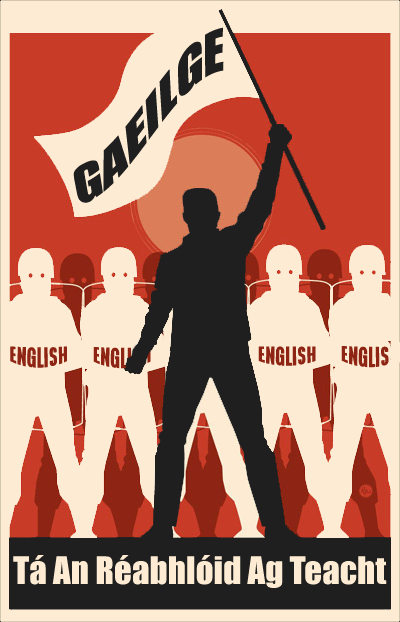
Irish Socialist Republicans believe that a central plank of what James Connolly termed the Reconquest of Ireland, of the struggle for National Liberation and Socialism, is the Reconquest of the Irish Language.
Continuing our series of Interviews to highlight the depth of mass work and community organising and activism Irish Socialist Republicans are involved in, today we speak to a comrade heavily involved in Irish Language Activism.
Interview With an ISR Irish Language Activist
Comrade, thank you for taking the time to speak to us on an issue if central importance to the Anti Imperialist and anti Colonial struggle in Ireland.
1. How and Why did you get involved in Irish language activism?
Irish has always been in my family. My grandfather was a native speaker, who had to learn English, and I have cousins on the Aran Islands who live their entire lives through the medium of the language so Irish is very dear to me. When I started to study Irish in university I was taught about how widespread Irish was even 100 years ago, and when I looked at the state of the language today I realized that something must be done in order to stop the decline of not only our national language, but the oldest vernacular language in Western Europe. So I joined a political society in college, and became their Irish language officer (Oifigeach na Gaeilge) where I started a policy of bilingualism in the society. Society emails were in Irish first and then in English. Meetings were bilingual to a certain extent ,and the language became normalized so much so that basic phrases such as go raibh maith agat, and feicfidh mé thú amárach were the norm.
2. What are the key challenges facing the language today?
Irish faces numerous problems in 21st Century Ireland both inside and outside of the Gaeltacht. Outside of the Gaeltacht Irish speakers face discrimination from state bodies despite the language being the first official language of the state and there being legislation to protect speakers. Due to GDPR regulations the síneadh fáda is often omitted from peoples names in official documents and online, which may seem trivial to some Béarlóirí in this country but to speakers of foreign languages an omission of an accent changes the entire meaning of a word. As well as this Irish speakers face being told that the only Irish speaker in a public service body is on holiday if they ring up requesting to speak Irish. Road signs, and bilingual signage are given the Google Translate treatment more often than not in this country which can be funny at times, but when one steps back and remembers that the people implementing Irish language policy can’t be arsed to open up a reliable dictionary this humour turns to anger. Within the Gaeltacht the situation is worse. People are being allowed to move to a predominantly Irish speaking area and build a house regardless of whether they speak the language or not. This has implications for the whole area. If this family go to the shop, the locals are forced to speak English, if this family decide to enroll their children in the local GAA team, the entire team has to speak English to accomodate a child who doesn’t speak Irish. Slowly English becomes more widespread than Irish and a situation occurs similar to the situations of Gaeltacht areas such as the Iveragh Peninsula and Barna in Galway where people CAN speak Irish, but chose not to. Language death is only hastened by the lack of any screening measures for people looking to move to a Gaeltacht area. In Leinster House the situation for the Irish language is appaling to say the least with the appointment of Josepha Madigan to the position of Minister for the Gaeltacht who is NOT an Irish speaker. On top of this less than roughly 1% of proceedings in Leinster House are conducted through Irish. The challenges facing Irish today are collosul.
3. As a Socialist Republican do you agree that the survival of the Irish language is a class issue?
I agree with this statement 100%. The Freestate apparatus founded in 1922 was established by the rich and wealthy garrison class. The founding fathers of this state were people like W.T Cosgrave who wrote in favour of poor houses. These politicians had adopted the position of the British who went before them and continued the lacklustre policies regarding the language that we see today. To them, there wasn’t, and isn’t much profit to be made from the Irish language, and that is part of the reason why the decline of Irish has accelerated since 1922. When official Gaeltacht boundaries were being drawn in the early years of the Freestate, County Clare, which was an Irish speaking heartland was excluded, as was the Omeath Gaeltacht in Louth, the last remaining Gaeltacht in Leinster at the time. This resulted in the accelerating of language death. When one looks at working class areas around the island of Ireland today, they will see a lot of Irish medium schools, and institutions. Coláiste De hÍde in Tallaght, An Culturlann McAdam Ó Fiach in the Falls, etc. The Irish language has a real potential to unite the working class as a common language, and a common goal to strive towards, the re-gaelicisation of Ireland as envisaged by Máirtín Ó Cadhain.
4. What suggestions do you advocate for the revival of the Irish language as the spoken language?
Every working class organization should appoint an Irish committee, and an Oifigeach na Gaeilge (Irish Language Officer) to oversee efforts to promote the language at cumann level. Lessons should be started without delay with key focus being on conversational phrases and vocabulary to make the language attractive and not to be seen as an outdated language, which is what the Freestate education system is perpetuating. Immersion trips should be planned by such organizations to Gaeltacht areas during summer months which is the key to learning any language. If these steps are followed, bilingualism will slowly be achieved in working class organizations, where both English and Irish will be the working languages and will become the day to day norm. Once these organizations begin to gain the support of the people the policies that are being carried out should be spread to the general public, lessons will be provided to the working class, documentation such as leaflets will be bilingual, and the language will become the norm. As a realist I believe that Irish will never overtake English as the predominant language of the country again, however through the determination and persevearance of the people, the language can rise like a phoenix from the ashes and become widespread once again.
What role can Socialist Republicans play in that struggle?
Socialist republicans can be at the forefront of that struggle by accepting that no concrete change will come from Irish language legislation through Leinster House and that they must take ownership of the language. The process will be a continual one, as an Irish speaker I believe that I’m still learning everyday, and that I’ll never stop learning. By learning and by spreading what they have learned socialist republicans will be doing far more than what this government is doing for the language. Socialist republicans can start off by incorporating simple words and phrases into their everyday vocabulary. After some time they will be able to have a bilingual conversation with friends and comrades, sometimes without even being aware of it. Then they will be able to converse fully in the language. Every socialist republican must become a teacher and spread the knowledge in order to bring the language back from the brink. There’s an old saying in Irish that I believe is relevant to this conversation “Tógann mionclocha caisleáin” meaning ” Small stones build castles”. By saying go raibh maith agat to the bus driver, you will help keep the oldest vernacular language in Western Europe alive.
7. What advice would you give to someone looking to learn the Irish language and become involved in the struggle to protect it?
To not get disheartened by what some West Brit elements of Irish society think. You often hear people, who funnily enough describe themselves as proud to be Irish, saying it’s a dead language. British colonialism has worked very well on these people, and it’s laughable that such people with very little knowledge of the language can jump to such assumptions. Prove these people wrong is my advice. Join Irish language classes, connect with your identity, and work to build the all Ireland revolutionary Gaeltacht. It’s no easy task, but listen to Irish language radio stations, go to conversation coffee mornings which are free of charge, go to the Gaeltacht. It will change your life and make you more aware of how the state oppresses our ” first official language” and reduces it to a minority language. We are lucky that more and more young people are beginning to take an interest in the language. We need to coordinate and organize. If you have always wanted to learn Irish then do something about it and join ISR and Macradh. Irish classes will be starting soon
